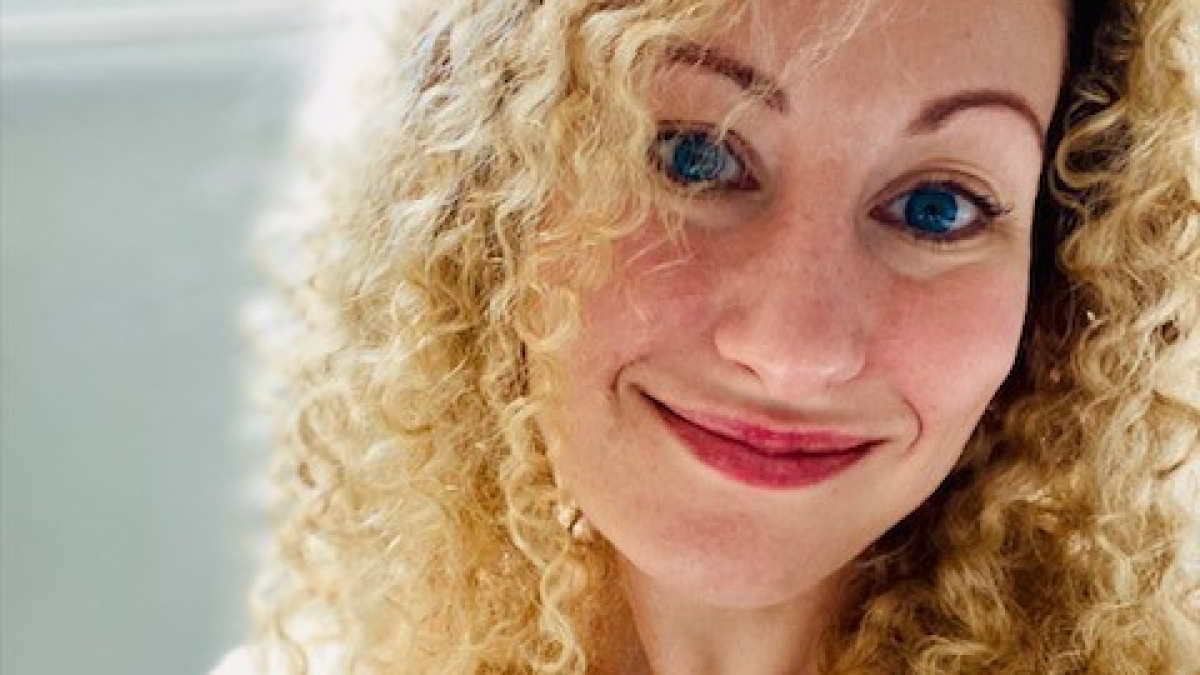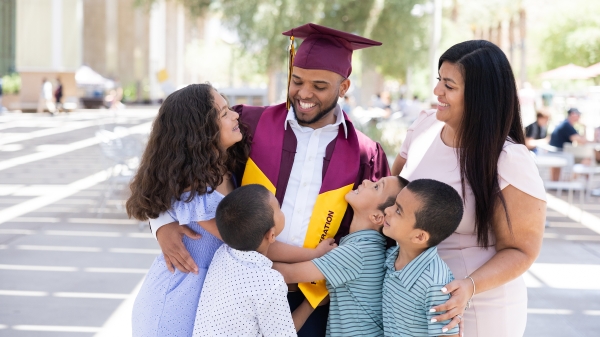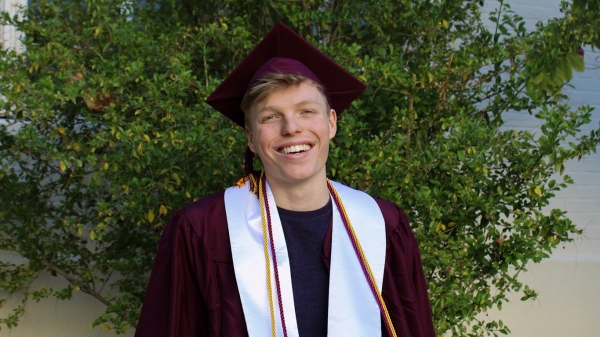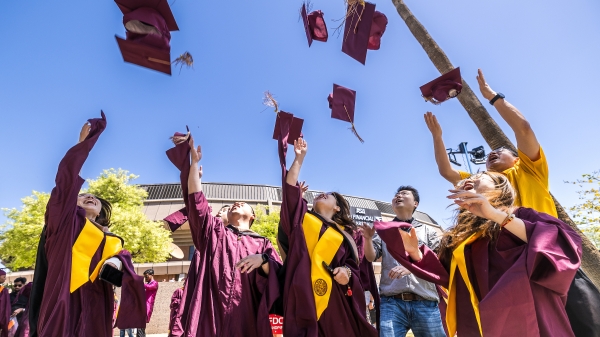When the coach becomes the student
EdPlus staff member finds mentorship, assistance in ASU program

"Countless advisors, coaches, and counselors have inspired me throughout the years, and I hope to be able to do that for even just one student," said Katie Guerin, a graduating ASU student and Starbucks career coach for EdPlus at ASU. "I am excited to take what I've learned in my MTESOL and continue in another program while advancing in my career."
Editor’s note: This story is part of a series of profiles of notable spring 2024 graduates.
What does it look like when the helper is the one who needs help?
Graduating Arizona State University student Katie Guerin can tell you. She experienced this role reversal during her graduate program.
Guerin is a Starbucks career coach at EdPlus at ASU. Before that, she was a success coach; both roles are part of the constellation of support that Starbucks partners and other ASU Online students receive when attending ASU.
Starting in fall 2022, Guerin took advantage of the ASU employee tuition benefit to enroll in the Master of Teaching English to Speakers of Other Languages online program in the Department of English. She aspired to be like the instructors at a French language school where she had previously thrived.
But just prior to last fall, Guerin was diagnosed with cancer. She had earlier sought medical care when she was living abroad, but her limited language skills impeded communication of her symptoms.
“While I held an intermediate level in French, it was still incredibly difficult to explain my symptoms to my doctor,” she said. “I was lucky my visa was denied because (in the U.S.) I was able to express my symptoms in a system I was familiar with and receive a proper diagnosis. This isn't always the case for people outside of their country of origin.”
By the time Guerin received her diagnosis in the U.S., almost a year had passed. She was working full time, was well into her academic program and was worried about completing the degree. But ASU staff stepped in to help Guerin advocate for herself.
“Several people at my work in the EdPlus Success Center and the English department whose opinions I valued so much encouraged me to stop and get care,” she said.
Cancer treatment didn’t stymie Guerin’s progress or affect her grades. She’s graduating with a master’s degree in TESOL this spring, after completing a research internship and a capstone project inspired by her own struggles. Her projects focus on aspects of health literacy: how people find and understand health knowledge and access resources.
“I am researching guidelines through a literature review and created a lesson plan for teachers who may introduce preventative health topics into their curriculum or as a stand-alone course,” Guerin shared. “Low health literacy levels are a dire problem for those who are unable to communicate in their local language, sometimes leading to later diagnoses and poorer outcomes.”
According to Guerin’s academic advisor, Kira Assad, an academic success specialist in the Department of English, even in the midst of everything Guerin has achieved “a very strong and successful academic record.”
“Her commitment to the program is incredible,” Assad said.
We asked Guerin a few more questions about how she arrived this moment and what’s next.
Question: What was your “aha” moment, when you realized you wanted to study in your field?
Answer: I've always wanted to visit France, and after years of waiting for a travel companion, I left on a solo trip. I stayed in Brittany (la Bretagne), a beautiful coastal region in Western France, and studied 20 hours a week at the local language school, Le Ciel. While I was there, I met everyone from doctors on sabbatical to recently relocated high school students to refugees that fled war. The instructors at Le Ciel were incredible — not only in their amazing teaching skills, but in how they treated each person in their class with care. It is very difficult acclimating to a new country, but these teachers and the director helped us find the resources we needed. Eventually I had to go home to the U.S., but I returned following the required three-month waiting period. I applied and was accepted into Rennes University to continue studying French, but my visa was denied during the height of the pandemic.
As I listened to sounds of people bustling in and out of the bakery just feet away from my apartment while preparing to return to the U.S., I decided I would learn to be like the teachers at Le Ciel, and I began looking for programs on teaching English to speakers of other languages. I knew that this degree would instill in me the foundations of teaching English, but as importantly, it would give me the knowledge to help those who come to English classes who are often vulnerable and needing assistance.
Q: What’s something you learned while at ASU — in the classroom or otherwise — that surprised you or changed your perspective?
A: With the right support, what seems impossible is possible. Just prior to the fall 2023 semester, I was diagnosed with stage 1 cancer and a genetic disorder. I normally have no room for pausing my plans, but those who knew me both personally, professionally and as a student encouraged me to look deeper into what was going on. Sometimes the most important things you learn are not from a chapter in your textbook, but in the way people step up when you are experiencing hard times. My academic advisor Kira Assad was one of these individuals and was there for me each step of the way with an enormous amount of patience and gentleness, which I try to pass on to my students as well.
Q: Why did you choose ASU?
A: I consider myself a lifelong learner, and when I saw that I could apply to be a success coach and study at a prestigious university, I did everything I could to get to Arizona! I had interviews at 9 p.m. in France and came back to the U.S. to move my things from California to the gorgeous Phoenix desert, though I had never previously visited Arizona. ASU was ideal, because of their expansive catalog of quality programs online. Once I started working at ASU, I knew I had found my work home. I can work with coaches who are filled with not just university knowledge, but oceans of empathy, and I truly wish everyone was able to experience a workplace like this. I have recently transitioned into a new role, career coaching, and continue to be grateful each day I connect with students.
Q: Which professor taught you the most important lesson while at ASU?
A: (Instructional Professional in English) Ruby Macksoud and (Faculty Associate in English) Alberto Lima are very compassionate individuals who patiently answered all my questions about research, the cross section of English and psychology, and PhD programs during countless Zoom sessions. While I learned many theories and applied them within their courses, what I found most impactful was their insight into becoming a professional in the world in academia. Students often tell me they are hesitant to speak to a professor, and we talk about ways to overcome the normal nerves. Macksoud and Lima approach their students in a way that enables them to share their wealth of expertise without being intimidating, and their interpersonal skills made me feel comfortable enough to have these vital conversations with them.
Q: What’s the best piece of advice you’d give to those still in school?
A: You have a huge support team of people that care about you! Every student has setbacks and roadblocks to work through — just realize that there are many people to reach out to at ASU when you need help. Even when things are going great, make connections! There is so much to do at ASU whether you are on campus or online, from study abroad to research assisting. Put yourself out there and try new things. This will help you grow as an individual as you add to your resume.
Q: What was your favorite spot for power studying?
A: I'm lucky to be able travel often with the love of my life, my boyfriend Alec Smith. Even when I was not feeling well and knew I wouldn't be able to do as much as usual, he encouraged me to keep traveling and visit amazing sights like the Grand Canyon. Since we are on the go, I've learned to study and write at hotels, as long as I have some lyric-free Nintendo soundtracks to listen to.
Q: What are your plans after graduation?
A: I plan to continue working with students, which is my passion. Countless advisors, coaches, and counselors have inspired me throughout the years, and I hope to be able to do that for even just one student. I also plan to apply for some graduate programs in psychology and counseling. I am excited to take what I've learned in my MTESOL and continue in another program while advancing in my career. My current capstone and internship merge the worlds of health literacy and teaching learners of English, and I plan to apply to the clinical psychology PhD with a specialization in health psychology.
I would be honored to be able to work on issues like disease prevention, and what psychological elements come into play keeping patients from receiving screening and care in a timely manner. I believe my background in both learning a foreign language and teaching speakers of other languages will give me special insight into difficulties in communication — which translate directly into roadblocks for health care, just as my undergraduate in psychology helped me think through the learner standpoint during my MTESOL. I am also interested in how these communication barriers effect physicians and psychologists as they diagnose and prescribe treatment options. Even beyond speaking in languages outside of one’s own, communication and information dissemination is vitally important and influences how we receive medical attention, and I am excited to continue to study this topic!
Q: If someone gave you $40 million to solve one problem on our planet, what would you tackle?
A: My current research — a very small study — has been looking at barriers which language learners run into when attempting to access social services. If I had $40 million, I would introduce experts in the fields of cancer, communication, community leadership and education to team up and spread awareness on how early detection can save lives.
More Sun Devil community

Starbucks, Uber commemorate milestone for ASU grads
For a growing number of Arizona State University students, their life trajectories have been vastly improved by the companies that support their college-going journey. Starbucks and Uber celebrated…

ASU grad blends art and entrepreneurship, setting sights on allergy-focused startup
Editor’s note: This story is part of a series of profiles of notable spring 2024 graduates. Tristan Tierce has spent much of his time at Arizona State University forging a unique path between the…

Advice to spring 2024 grads: 'Spend your time creating new things'
The largest graduating class in the history of Arizona State University celebrated their new degrees with “Pomp and Circumstance” during spring 2024 commencement ceremonies on Monday. Of the nearly…